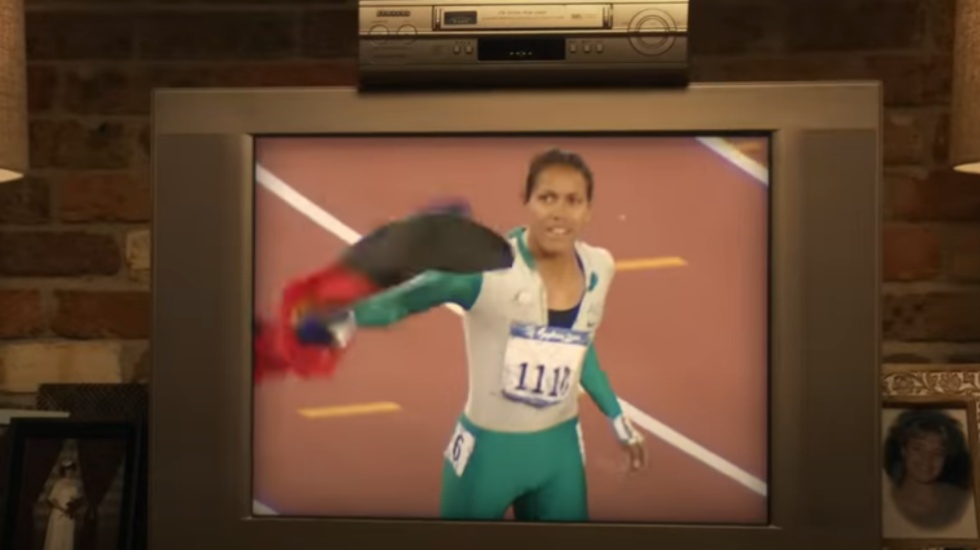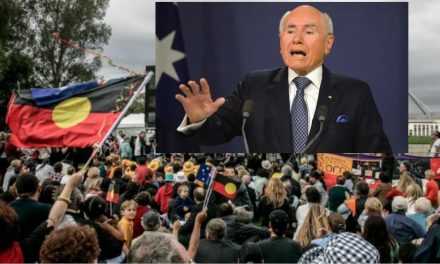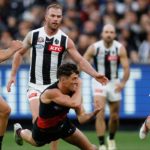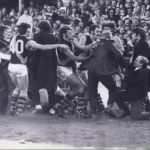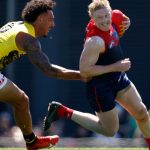Cathy Freeman’s legendary gold medal-winning run is featured in the Yes campaign’s ad for the Voice referendum. Image: The Uluru Dialogues
Sometimes, all that glitters is not gold. Witness the ad using the song ‘You’re the Voice’, a megahit for John Farnham, as part of the campaign for voting Yes in the referendum.
A poll for The Age by Resolve Strategic, published on Monday, shows the Yes vote falling and the No vote rising. And the Yes campaign, using Farnham’s hit as its anthem, has had little to no effect in boosting support. Said Resolve director Jim Reed: “If anything, the campaign is having the opposite effect because the No vote is still growing.”
There’s no doubt the video is an accomplished piece of work. The merging of moments and people in Australia’s recent history, such as Cathy Freeman winning gold at the Olympics, Indigenous legends in the AFL and NRL, Michael Long and Johnathan Thurston, Kevin Rudd’s apology to the Stolen Generations, John Howard’s gun reform, and bizarrely, Bob Hawke celebrating Australia winning the America’s Cup, is uplifting and emotional.
Splice in the music and extracts of the song’s lyrics and you could have been forgiven for thinking this would help get the faltering Yes campaign over the line. As the latest poll has shown, and to sound a discordant note, it is marginally effective.
The aim of an ad is to persuade people to buy a product and/or adopt a favourable view towards that product. It also reinforces that view among those who already are favourable to it. The people who were going to buy this product, that is the message to vote Yes, were already going to do so. Success is measured in persuading the non-buyers, and the undecided. This isn’t going to do it because while it highlights grand moments, it does not address the core issues of the debate.
John Farnham singing “you’re the voice try and understand it/Make a noise and make it clear, whoa, whoa whoa″ of course seems fit for purpose. But it is not a song, as was suggested, awaiting for its moment in history. Unlike civil rights anthems like ‘We Shall Overcome’, this one is ambiguous enough lyrically to be used by either side.
“We’re not gonna sit in silence/We’re not gonna live with fear/Oh, whoa/This time, we know we all can stand together/With the power to be powerful.” Hello, No campaign.
PLEASE HELP US CONTINUE TO THRIVE BY BECOMING AN OFFICIAL FOOTYOLOGY PATRON. JUST CLICK THIS LINK.
A core, indeed essential, strength of a song’s power is ownership. A song lives a long life because of its resonance with the listener, its call and response – one bell chiming to another.
In ownership, first, of course, there’s the song’s creator, and in legal terms the copyright owner, and then there’s the unofficial copyright. This is the ownership asserted by the fans of the song, who take hold of it and grasp it as their own. In that sense, no other has control over their relationship with it. And if something is inserted into this link – such as an ad campaign, a cause – the rhythm of the song turns negative. It warps the listener’s relationship of what that song means to them, personally.
This is more powerful than extrapolating it onto a cause. In short, it will infuriate people beyond measure. People take out of a song different things. To marry it to a cause can lead to a divorce with other sections of the community. It can actually reinforce the opposite to what the ad’s intentions were.
It’s also possible that the dynamics of power and crowd manipulation will come into play, as Nobel laureate Elias Canetti wrote in his book Crowds and Power. Power and paranoia, and their perceptions among people, are relentless forces.
Farnham said recently: “This song changed my life. I can only hope that now it might help, in some small way, to change the lives of our First Nations peoples for the better.”
Uluru Dialogue co-chair Megan Davis said Farnham was contacted more than a year ago for support. “‘You’re the Voice’ is the nation’s unofficial anthem,” Davis said. “History isn’t just something we witness and observe, but something we ourselves can influence. And now we all have a voice in what happens at this critical moment, and we must use it.”
The ad was to show “the many moments of joy we’ve shared”.
The latter is inarguable. What is arguable is that ‘You’re the Voice’, despite its immense popularity, is the nation’s unofficial anthem. Equally to some is ‘Waltzing Matilda’, and ‘Down Under’ by Men at Work.
As to the power of the song in the context of this referendum, that lies in the ears of the beholders, and some it seems do not like what they hear.

